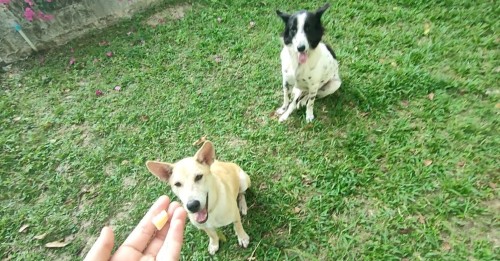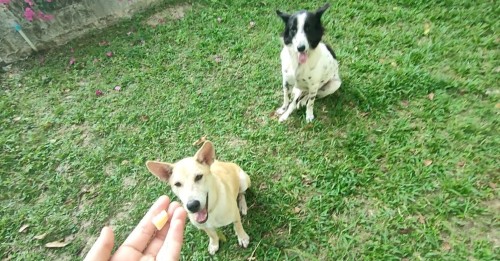Everyone loves cheddar cheese since it is impossible to resist its scent and flavor. And when you eat it, your dog might look at you like he wants to bite it too. So, the question is: can dogs eat white and sharp cheddar cheese? Is it good or bad for them to eat it? Can they eat cheddar cheese crackers, popcorn and goldfishes?
Can Dogs Eat Cheddar Cheese?

Cheese with comparatively low salt and lower fat content is thought to be healthy for dogs.
For example, cheddar is considerably less in fat, salt, and lactose than other varieties of cheese, so feeding a few pieces to your dog as a treat is perfectly alright.
In reality, Cheddar cheese provides incredible health advantages to dogs, particularly if served in moderation.
To begin with, cheddar cheese is a fantastic provider of calcium and phosphorus.
Phosphorus potentiates the favorable effects of calcium in strengthening your dog’s bones.
Phosphorus is also a formidable heart-healthy mineral that is known for its crucial function in maintaining liver and kidney health.
Cheddar cheese is also rich in Selenium, a trace mineral that has good antioxidant effects and may help the immune system of your dog.
In addition, cheddar is a wonderful source of Vitamin A, B12, vital fatty acids, and Riboflavin.
Can Dogs Eat Sharp Cheddar Cheese?
Yes. Even though there are different types of cheddar cheese in the market, it won’t make a huge difference which one of them you choose to give your dog, as long as you remember not to let him eat too much.
If your dog is not lactose intolerant, eating a bit of cheddar won’t hurt him.
You should just remember that this is not part of his necessary diet, so he can eat a bit and return to his regular food.
Moreover, you may also use Cheddar cheese as a reward during training or for reducing separation anxiety in dogs. If your dog resists eating pills, you may use cheddar to get the dosage down the hatch.
Regardless of whether you decide to offer your dog cheddar as a treat or a reward during training, avoid giving him too much.
Just a few pieces periodically should be enough, and your furbaby will adore you for it.

Is Having Some Cheddar Good Or Bad for A Dog FAQ
Can Dogs Eat Cheddar Cheese Pringles?
Many pet owners ask whether cheddar cheese pringles are safe for their dogs. These chips are flavorful since they include a variety of flavors.
Numerous of these seasonings may cause your dog to get ill.
Spices such as onion, garlic, and salt are all poisonous to dogs. They may cause severe gastrointestinal discomfort, including diarrhea and vomiting.
If your dog eats an excessive quantity of onion and garlic, it may actually cause harm to his red blood cells, resulting in anemia.
Consuming a trace of these spices may cause the loss of only a few red blood cells, but is still not advised. Additionally, chives, onions, and scallions may make your dog ill in the same manner.
You might be thinking, “well, but the cheddar cheese flavor should be safer, no?” and the answer is still “no.” We can’t make sure there are no vestiges of onion and garlic in this flavor.
Can Dogs Eat Cheddar Cheese Popcorn?
Can dogs eat cheddar? Yes. Can dogs eat popcorn? Yes, but without any toppings. So, can dogs eat cheddar cheese popcorn? Absolutely not!
While cheddar popcorn is wonderful, dogs should not be given it or any other kind of cheesy popcorn.
The “cheese” added to popcorn is really a combination of extra salt, oils, and milk products that are harmful to your pet.
Dogs do not benefit from additional salt or oil and may even be lactose intolerant. As a result, it’s better to avoid giving your pup cheesy popcorn entirely.
Can Dogs Eat Cheddar Cheese Crackers?
Yes, dogs can sometimes have cheddar cheese crackers in moderation. They are, however, rich in three things you should avoid feeding your pets in excess: salt, calories, and dairy.
Dogs are very salt sensitive, and they may get salt poisoning if they consume an excessive amount. Vomiting and diarrhea are signs that your dog consumed too much salt.
Additionally, you should monitor how many additional calories your puppy consumes (in addition to their dog food).
Dogs that consume an excessive amount of calories are at an increased risk of developing weight-related health problems such as heart disease and diabetes.
The calories in the crackers are nutritionally worthless to your dog and will result in harmful weight gain.
Finally, you should monitor your pet’s dairy consumption, particularly if you are unsure if they are allergic or not.
Can Dogs Eat Cheddar Cheese Goldfish
Goldfish crackers, according to the manufacturer’s label, include onion powder and less than 2% unlisted, generic spices.
Although this is a small quantity, onion and garlic are both poisonous to dogs. So the general rule is never to feed goldfish crackers to your dog!
If your beloved dog accidentally swallows a few Goldfish crackers, they will probably be OK.
However, if you believe your dog ate a lot of goldfish crackers and is showing indications of food poisoning, you should call your veterinarian immediately.
Can Dogs Eat White Cheddar Cheese?
Yes, dogs can definitely eat a few slices of white cheddar cheese. Since it is only a slight variation of cheddar cheese, it is fine if your dog eats it.
To be sure, dogs can eat all types of cheddar cheese, but keep in mind that they can only eat a tiny bit each time.
Final Words About Can Dogs Eat Cheddar Cheese
Dogs and cheddar cheese is a common topic among dog owners as they worry if their pups can eat food that is cheddar-flavored.
Can dogs eat cheddar cheese? Yes, they definitely can eat a few bites without feeling ill. Is it good or bad for them? It is neither, to be honest, unless your dog eats too much of it.
Now, as for food that is cheddar-flavored, you should worry a bit more. Pringles, goldfish crackers, and popcorn are all things your dog shouldn’t eat.
Some crackers that do not contain garlic or onion, however, are safe for your dog.
Table of Contents
